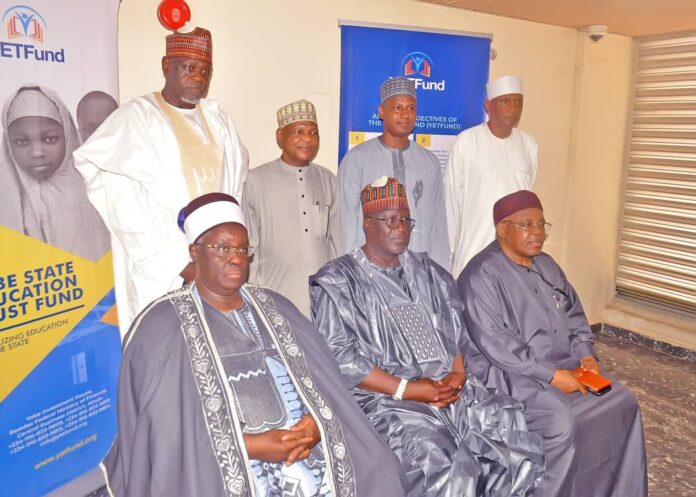
Yobe moves to revive education sector with over N25 billion
Story from Emmanuel OLOGUN, Abuja.
The Yobe State Government has launched a detailed initiative to generate more than N25 billion in the next five years to enable the administration of Governor Mai Mala Buni to revive education, which suffered massive destruction at the hands of Boko Haram insurgents in the past seven years.
Disclosing this while speaking with newsmen at the sideline of a one-day retreat organised at the Yobe Investment House in Abuja last weekend by the state government for stakeholders in the education sector, Chairman of the Board of Trustees for Yobe State Education Trust Fund (YETFund), Engineer Mohammed Abubakar, explained that the state has experienced an unacceptable setback in education as a result of insurgency.
READ ALSO: Operational guidelines necessary tool for YETFund’s take off – Gov. Buni
He explained that the state decided to launch an Education Trust Fund to revive learning because the education sector was thoroughly devastated and students were frightened of going to school due to frequent kidnappings and killing of school children by terrorists.
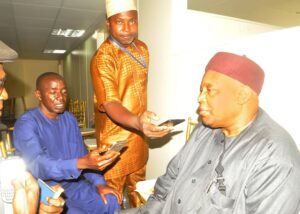
“Insurgency gave education a serious blow in Yobe State and it will require serious effort to restore the system to what it used to be. We have learnt from our experience and working with various security agencies, we are hopeful to prevent such things from happening again.
READ ALSO: Emir of Fika pledges royal support towards educational dev’t in Yobe
“Almost every aspect of education was affected and we do hope that the Trust Fund will provide support and intervention to eliminate out-of-school children roaming the streets in the state. We also intend to get better teachers, train and retrain them apart from providing necessary infrastructure like classrooms among others for a quality learning environment,” Engineer Abubakar said.
Commissioner for Basic Education, Dr Mohammed Sani Idris, while corroborating the chairman’s comments said the government will leave no stone unturned in reviving western education in Yobe to raise the rating of the area adjudged as an educationally disadvantaged state.
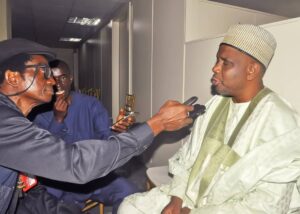
He stated that because of the sensitivity of the community, the government had decreed that a dual learning curriculum, which offers both Quranic and western education, should be operated in the state.
“In Yobe State, we have 3, 330 Quranic schools with a population of more than 200, 000 pupils whereas public western schools are only 1, 275 with a population of less than 100, 000 pupils. The disparity is too high but it shows the preference of the people who prefer Quranic studies to western education for their children.
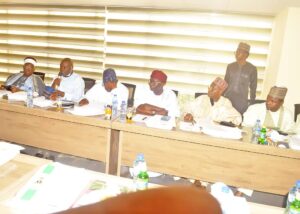
“Yobe is now spending so much (about N1 million Naira) monthly to sustain some of the students in higher institutions outside the state.
“Just last year, about eight of our primary and secondary schools were completely destroyed in an attack by insurgents. The reconstruction was not captured in the budget which was already running before the attack. The state governor recently approved the renovation of some schools at the cost of N2.6 million. All this we are doing to boost Western education in Yobe state,” Dr Sani Idris assured.
Also speaking on the education retreat, the Special Adviser (SA) to Yobe State Governor on Legal Matters, Barr. Baba Dala said more than N2 billion was pledged when the Education Trust Fund was launched but added that the state government will rely on donor agencies and internally generated revenue for money to fund the scheme.
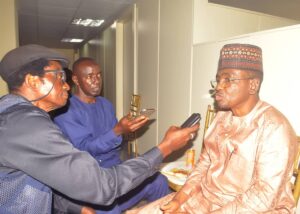
“This retreat was organised to enable us, the stakeholders, to brainstorm, interact and share ideas about how to develop an operational guideline to make the scheme a success. We choose our type to Trust Fund to enhance corporate governance and move away from state bureaucracy to enhance the capacity of the Trust Fund to engage international donor agencies and create innovations on how to raise money for the scheme,” Barr. Dala stated.
Follow the Neptune Prime channel on WhatsApp: https://whatsapp.com/channel/0029Va74ZvU2v1IqKByXoX3d
Do you have breaking news, interview request, opinion, suggestion, or want your event covered? Email us at neptuneprime2233@gmail.com

